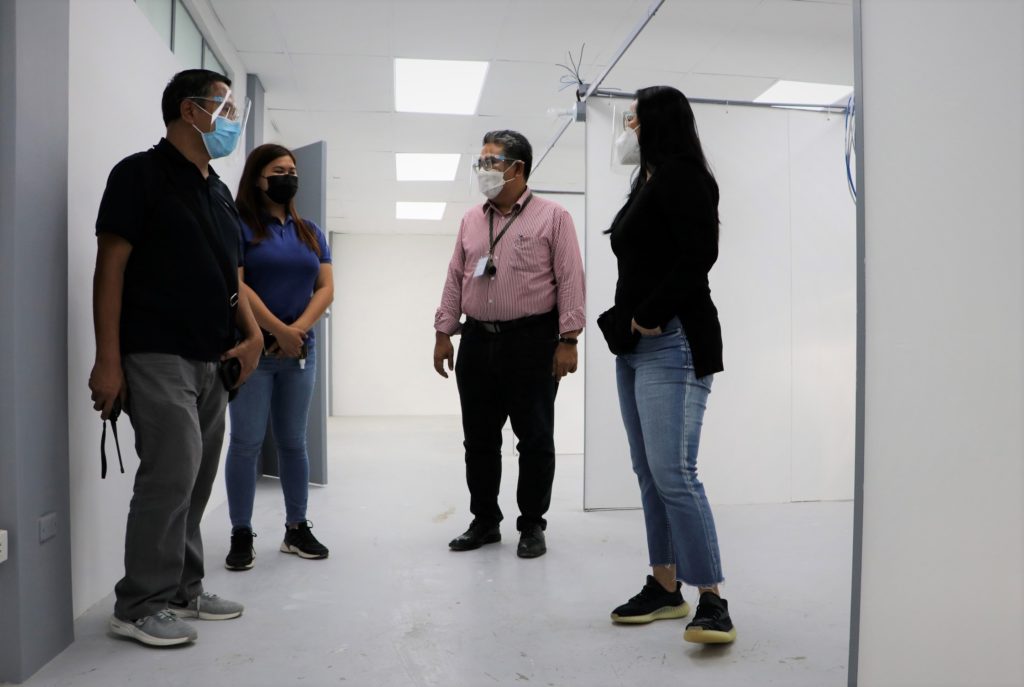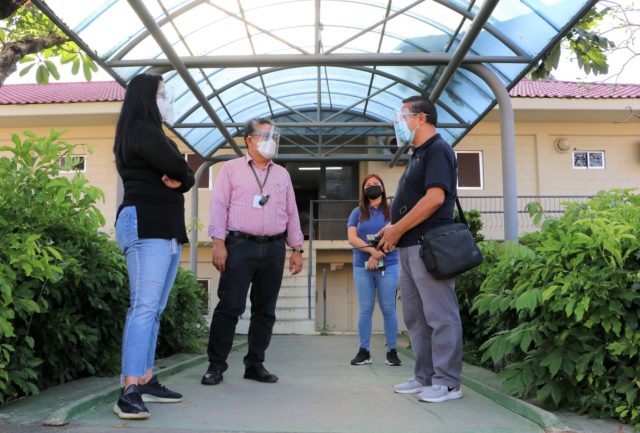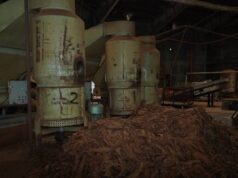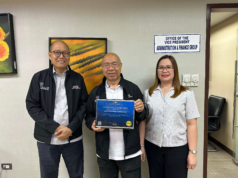SBMA Chairman and Administrator Wilma T. Eisma visits the 500-bed Cubi isolation facility on Tuesday with Subic Bay Freeport Chamber of Commerce (SBFCC) President Benjamin Antonio III (in pink long-sleeved shirt), Manila Times College of Subic Vice President for Operations Ryan Tulio (in blue shirt), and DPWH Zambales 2nd District Project Engineer Karen Gail C. Miguel. Photo by Malou Dungog
SUBIC BAY FREEPORT – The Subic Bay Metropolitan Authority (SBMA) has allayed fears by stakeholders of this Freeport that the 500-bed mega isolation facility being prepared by the government at the former Cubi Hospital complex here might expose more local residents and workers to the coronavirus disease (Covid-19).
SBMA Chairman and Administrator Wilma T. Eisma, who visited the facility located in Subic’s Ilanin Forest East on Tuesday, defended the government project and said that the remote location of the facility, as well as strict health protocols observed in Subic, would ensure the safety of everyone.
“The number one assurance we can give them is this location, which is so far away from everybody else,” Eisma said in an interview at the project site. “I would like to emphasize that this hospital is in a fenced and gated compound and that it is virtually a self-contained community.”
“I am sure that the Office of the Civil Defense (OCD) will take all the necessary steps to make sure that everybody who will be working here and will be confined here will be limited to the compound. And if there is a need to go out, they will be properly guarded, properly monitored,” she added.

Eisma also pointed out that Subic has one of the lowest numbers of Covid-19 cases in the country because of strict adherence to protocols despite the presence of a Covid-19 hospital, isolation facilities, and swabbing and testing centers in the Freeport.
She said that this was precisely why Subic has been chosen as an international crew-change hub, as well as a popular destination for events under the “bubble” set-up.
“I’m quite sure, by this time, we already know what to do,” Eisma said. “With what we have learned from the past and what we continue to learn, I can guarantee the community of Subic that we will do everything to make sure that not only is this place contained, but that this place will also service the needs of the community when the need arises,” she added.
“Initially, the plan is that only mild and asymptomatic patients will be brought here until the emergency room and the intensive care unit inside the facility will be up and running,” Eisma said.
The 500-bed mega isolation facility for Covid-19 patients in Subic is expected to be ready in early April, as the government sought to increase the number of quarantine and temporary treatment and monitoring facilities (TTMF) and boost the country’s healthcare system capacity.
Last week, National Task Force (NTF) against Covid-19 Deputy Chief Implementer and testing czar Vivencio “Vince” Dizon said the Subic facility was developed as occupancy rate in government quarantine facilities for Covid-19 patients rose dangerously to 70 percent.
Dizon said the new quarantine and temporary treatment and monitoring facility could accommodate asymptomatic or mildly symptomatic Covid-19 patients and allow hospitals to attend to those with medium to severe symptoms.
Subic’s Covid-19 isolation facility will use 11 out of some 20 buildings in the former Cubi Hospital complex that also recently housed The Manila Times College Subic (TMTCS) campus. The facilities in the 12-hectare complex include a 100-bed hospital that served as the U.S. Navy’s Pacific regional medical center from 1977 to 1983.
The Department of Health (DOH), along with the Department of Public Works and Highways (DPWH), is now renovating the hospital and some adjoining buildings, including those that will serve as quarters for medical personnel and other support staff.
Once the Subic isolation facility is ready for occupancy, the DOH will be running the operations while the OCD will be managing security and logistics, Eisma said.





